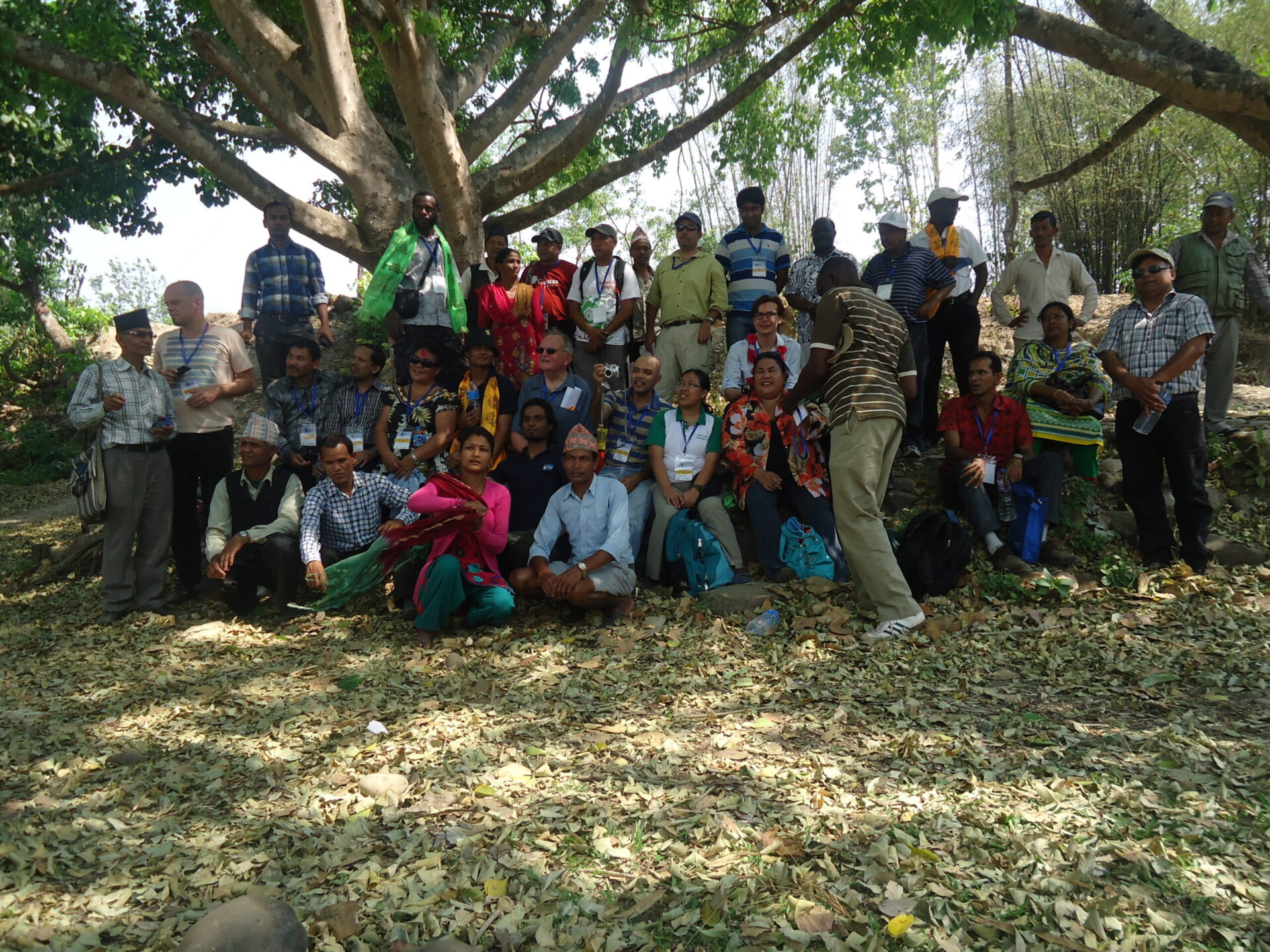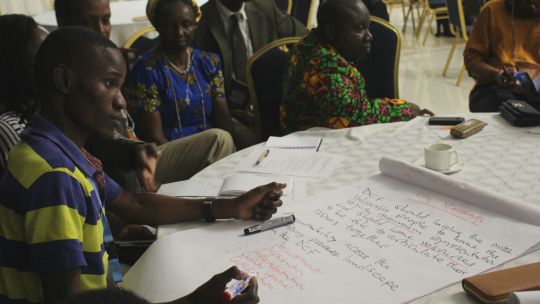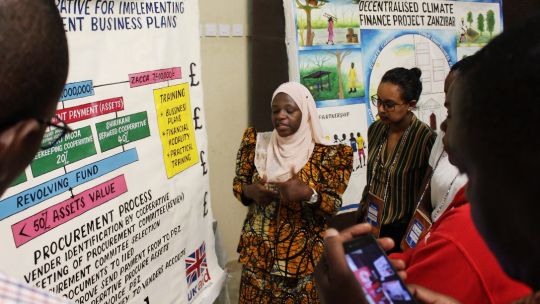Article /
The International Conferences on Community Based Adaptation (CBA) to climate change

Building a local-to-global CBA community
In January 2005, the first international conference on Community-Based Adaptation (CBA1) convened with more than 80 experts, policymakers, NGO representatives and grassroots practitioners, in Dhaka, Bangladesh. This was initiated in partnership between the International Institute of Environment and Development (IIED), the Bangladesh Centre for Advanced Studies (BCAS), the Regional and International Networking Group (RING) Alliance of Policy and Research Organisations.
Since then (as of April 2019), thirteen international CBA conferences have been held in eight different countries in Asia and Africa. Keynote speakers have included Nobel Peace Prize winner Muhammad Yunus (CBA3), Louise Chamberland UNDP, Bangladesh Prime Minister Sheikh Hasina (CBA5), then Executive Secretary of UNFCCC Christiana Figueres, Margareta Wahlstrom, Special Representative of the UN Secretary General for Disaster Risk Reduction, and Atiq Rahman of BCAS, among many illustrious speakers.
GICBA, the Global Initiative for Community Based Adaptation, was launched on the weADAPT platform from a CBA conference in 2006, and is being updated in 2019 with a fresh infusion of activities and strategies from CBA13. Click here for updates and sharing from CBA13.

Some Key Outputs from CBA conferences
Numerous outputs from each CBA conference have been produced and shared online, including videos, interviews, blogs, reports and more. Click on the links below to access these resources on IIED’s website. To learn more about all previous CBA conferences, go to the iied CBA Conference archive.
CBA13: Local solutions inspiring global action
- The 13th international conference on Community-Based Adaptation to Climate Change (CBA13) was held in Addis Ababa,1-4 April, 2019. The program placed emphasis on three interlocking themes: climate finance, adaptation technology, and policy engagement.
- Key aims were to facilitate the gathering of a community of practitioners collectively seeking to reimagine solutions to climate change that enable transformative outcomes through the agency of communities.
- The values and intent brought imbued within the conference proceedings were for inclusive, gender-transformative and meaningful engagement, sharing and collaborating around good practice and challenging assumptions, drawing on evidence to inform the scalability of effective approaches, and influencing and shaping decision making processes. Find out more here.
CBA12: Local experience driving climate action
- The 12th CBA conference in Lilongwe, Malawi, focused on getting local experience on climate action heard. Adaptation practitioners, researchers, policymakers and investors met at CBA12 to discuss how to promote local action on climate change.
- Read the key messages that came out of the discussions. These messages focus on getting local, lived experience on climate action shared through three workstreams: devolved climate finance, adaptation technology innovation, and local knowledge driving better policy and investments.
CBA 11: Harnessing natural resources and ecosystems for adaptation
- The 11th CBA conference in Kampala, Uganda, focused on harnessing natural resources and ecosystems for adaptation and was linked with the UNFCCC Regional National Adaptation Plan Expo. A youth conference ran parallel to the main CBA11 conference. This focused on ‘enhancing the ability of youth to build ecosystem resilience’, and examined ways to incorporate the ideas and innovations of young people into policy recommendations.
- Watch daily video round-ups from IIED senior fellow Saleemul Huq and read the CBA11 conference proceedings (event report).
CBA10: Enhancing urban community resilience
- The 10th CBA conference in Dhaka, Bangladesh, urged NGOs, infrastructure investors and government to work with community federations for mainstreaming local level adaptation and ensuring that finance reaches those most vulnerable to climate change in urban settlements.
- Read the calls for governments, NGOs and infrastructure investors to work with urban community federations to mainstream / finance local adaptation
- Read the viewpoint Ecosystem- and community-based adaptation: learning from community-based natural resource management (Reid, 2014). Improved learning from older natural resource management disciplines such as community-based natural resource management (CBNRM), however, could help inform EbA and CBA practice and policy-making. This viewpoint describes key lessons from CBNRM that EbA and CBA should address as they mature. This paper was informed by and shared in CBA conference gatherings.
CBA9: Measuring and enhancing the effectiveness of adaptation to climate change
- The 9th CBA conference (CBA9) in Nairobi, Kenya, focused on measuring and enhancing the effectiveness of adaptation to climate change and had practitioners from all continents of the world share their experience with each other.
- CBA9 resulted in the Nairobi Declaration on Community-Based Adaptation to Climate Change. This declaration was put forward by representatives of a range of public, civil society, private, local, regional, international agencies, and governmental and non-governmental organisations meeting in Nairobi, Kenya at the 9th International Conference on Community-Based Adaptation (CBA9). At CBA9, participants discussed methods for measuring the effectiveness of adaptation to climate variability and change for the poorest and most vulnerable.
CBA8: Latest developments in CBA financing, planning and best practices
- The 8th CBA conference in Kathmandu, Nepal brought together different stakeholders and practitioners to share and discuss knowledge on CBA financing, planning and best practice and enhancing the capacity of the most vulnerable groups and people, improving their livelihoods and integrating lessons learnt on financing CBA into local, national and international planning for development and climate change; and on developing a minimum set of advocacy ‘asks’ for financing local adaptation. Roughly 450 people from 58 different countries attended, including representatives from governments and many of the large international and bilateral funds, donors and foundations currently supporting CBA.
- CBA8 resulted in
- The Kathmandu Declaration on Financing Local Adaptation to Climate Change, which was presented by representatives of a range of public, civil society, private, local, regional, international agencies, and governmental and non-governmental organisations at the meeting. The Declaration calls for a radical shift in flows of finance to ensure the most vulnerable communities can adapt to climate change.
- The report “Kathmandu, Community Based Adaptation: Financing Local Adaptation“, which notes the need to understand how best to finance the growing number of CBA project and programme activities.
CBA7: Mainstreaming CBA into into international, national and local planning and processes
- The 7th CBA conference in Dhaka, Bangladesh, shared the latest thinking on approaches for mainstreaming community-based adaptation into international, national and local planning and processes.
-
CBA 7 resulted in the report “Community Based Adaptation: Mainstreaming CBA into national and local planning“. This reports looks at the processes, dynamics, opportunities and challenges to mainstreaming CBA into national and local planning. Its considerations include CBA & Agriculture, CBA & DRR, CBA & EbA, water systems, drylands climate resilience, population dynamics and Rights.
To further explore CBA themes over the years, outputs, activities and CBA actors, visit the iied.org link to the CBA Conferences archive. Join the CBA online community on weADAPT through the CBA Theme!

